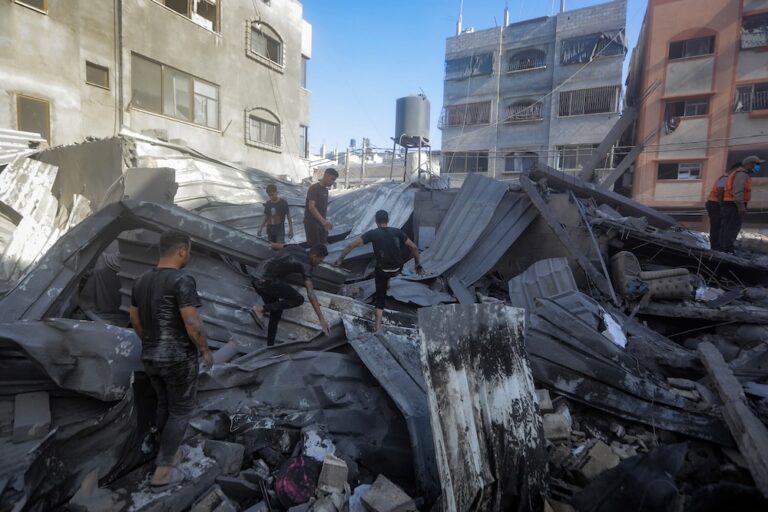(RSF/IFEX) – On 25 April 2002, RSF called on Israeli Prime Minister Ariel Sharon to release three Palestinian journalists, one of whom is ill. “These journalists were just doing their job, according to our information, and we want an explanation as to why they were arrested,” RSF Secretary-General Robert Ménard said in a letter to […]
(RSF/IFEX) – On 25 April 2002, RSF called on Israeli Prime Minister Ariel Sharon to release three Palestinian journalists, one of whom is ill. “These journalists were just doing their job, according to our information, and we want an explanation as to why they were arrested,” RSF Secretary-General Robert Ménard said in a letter to Sharon.
The three detained journalists are Maher Hussein Romanneh, a presenter from Voice of Palestine radio, Jalal Hameid of the privately-owned Bethlehem TV station Al-Rouah and Hussam Abu Alan, an Agence France-Presse (AFP) photographer. “We are especially concerned about Romanneh’s health and we ask that he be taken to hospital as soon as possible,” Ménard wrote.
Since the start of the Israeli occupation of Palestinian towns and cities on 29 March, RSF has counted 17 arrests of Palestinian journalists, some of whom have been roughed up and humiliated. After a fact-finding mission to Israel from 5 to 7 April, RSF said the Israeli army was “deliberately intimidating journalists,” especially those from the Palestinian media.
Photographer Abu Alan was arrested on 24 April at the Beit Anun checkpoint near Hebron. Along with Reuters cameraman Mazen Dana and other journalists, he was going to Bani Naim to cover the funeral of two Palestinians. Soldiers asked the photojournalists to take off their bulletproof jackets and helmets and show their IDs. Their mobile phones and other equipment were confiscated. Abu Alan was then blindfolded and handcuffed and taken away in a tank.
Dana was released a few hours later. “They taunted, humiliated and threatened me,” he told RSF. The army appeared to have handed Abu Alan over to the Israeli secret police, the Shin Beit, for interrogation. An army spokesman told the agency that he had been arrested because he had been in the C zone, an area entirely under Israeli control, and because he had no press card. Abu Alan, who lives in Hebron, has worked for AFP for seven years. Like most Palestinian journalists, he has not been able to get his Israeli press card renewed since the beginning of the year.
Ashraf Farraj and Hameid, editor-in-chief and journalist, respectively, from Al-Rouah, a local Bethlehem station, were arrested by the Israeli army at the press centre in Bethlehem on 3 April with several other journalists. According to Hamdi Farraj, the head of Al-Rouah, the other journalists were released soon afterwards, but Ashraf Farraj and Hameid were taken to the Beitunia Detention Centre, near Ramallah. Ashraf Farraj was released on 24 April but Hameid is still being held.
Romanneh was arrested on 30 March in Ramallah and taken to the Ofer Detention Centre. RSF has learned that he has two broken ribs and that the army has refused to take him to hospital. His family has not been allowed to visit him either.
Ahmed Assi, an ANN cameraman, was released on 24 April. He and Atta Iweisat, a photographer from the Israeli daily “Yediot Aharonot” and the Gamma agency, were arrested on 2 April with other foreign journalists. They were handcuffed and forced to kneel in the pouring rain before being blindfolded and taken to the Beitunia Centre for interrogation. Iweisat was released later that day.


